
Aerospace and defense company Howmet (NYSE: HWM) met Wall Street’s revenue expectations in Q3 CY2024, with sales up 10.7% year on year to $1.84 billion. Next quarter’s revenue guidance of $1.87 billion underwhelmed, coming in 1.2% below analysts’ estimates. Its non-GAAP profit of $0.71 per share was 8.6% above analysts’ consensus estimates.
Is now the time to buy Howmet? Find out by accessing our full research report, it’s free.
Howmet (HWM) Q3 CY2024 Highlights:
- Revenue: $1.84 billion vs analyst estimates of $1.85 billion (in line)
- Adjusted EPS: $0.71 vs analyst estimates of $0.65 (8.6% beat)
- EBITDA: $487 million vs analyst estimates of $468.3 million (4% beat)
- Revenue Guidance for Q4 CY2024 is $1.87 billion at the midpoint, below analyst estimates of $1.89 billion
- Management raised its full-year Adjusted EPS guidance to $2.66 at the midpoint, a 4.3% increase
- EBITDA guidance for the full year is $1.90 billion at the midpoint, in line with analyst expectations
- Gross Margin (GAAP): 31.7%, up from 28.7% in the same quarter last year
- Operating Margin: 22.9%, up from 18.5% in the same quarter last year
- EBITDA Margin: 26.5%, up from 23% in the same quarter last year
- Free Cash Flow Margin: 8.8%, similar to the same quarter last year
- Market Capitalization: $41.7 billion
Howmet Aerospace Executive Chairman and Chief Executive Officer John Plant said, “Revenue growth of 11% year over year took account of actions which restricted volumes shipped to the Boeing Company and notably weaker Europe market conditions impacting Forged Wheels. We are pleased that the Boeing strike was settled on November 4th, and we look forward to Boeing’s gradual production recovery. Engines spares volumes increased again in the quarter and are expected to be approximately $1.25 billion for the full year.”
Company Overview
Inventing the first forged aluminum truck wheel, Howmet (NYSE: HWM) specializes in lightweight metals engineering and manufacturing multi-material components used in vehicles.
Aerospace
Aerospace companies often possess technical expertise and have made significant capital investments to produce complex products. It is an industry where innovation is important, and lately, emissions and automation are in focus, so companies that boast advances in these areas can take market share. On the other hand, demand for aerospace products can ebb and flow with economic cycles and geopolitical tensions, which can be particularly painful for companies with high fixed costs.
Sales Growth
Examining a company’s long-term performance can provide clues about its business quality. Any business can put up a good quarter or two, but the best consistently grow over the long haul. Howmet’s demand was weak over the last five years as its sales fell by 3.8% annually, a rough starting point for our analysis.
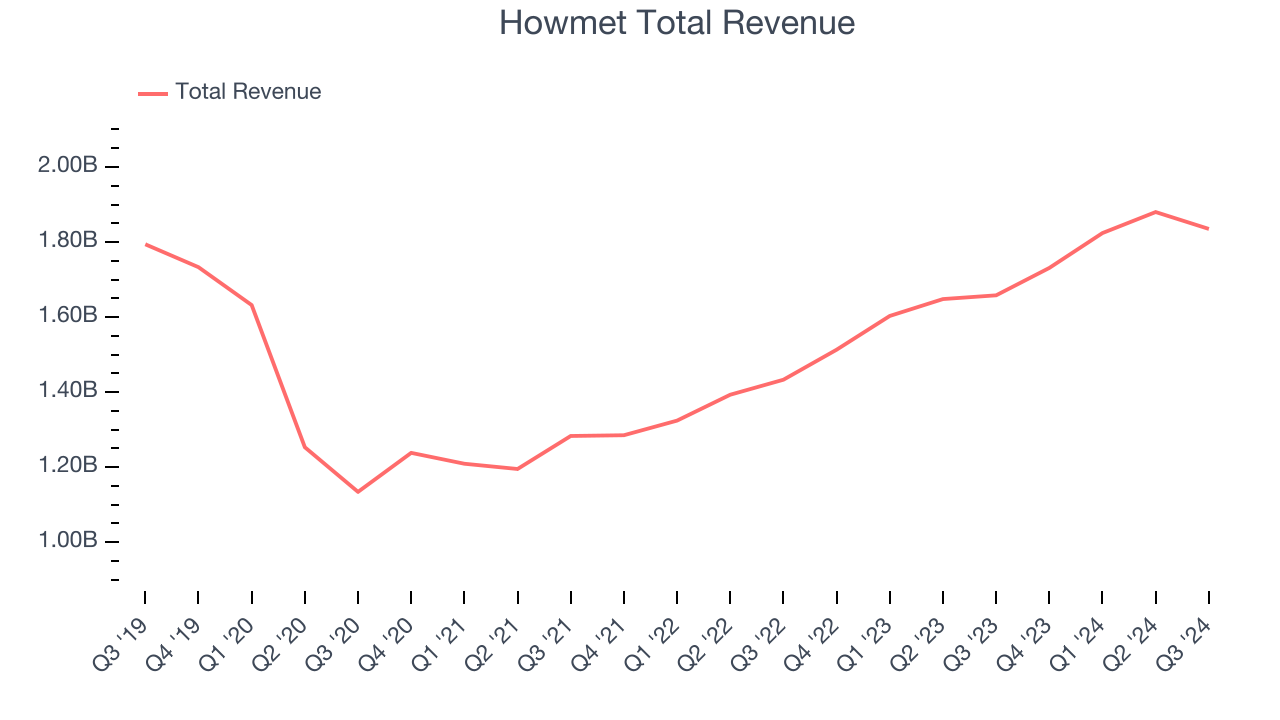
We at StockStory place the most emphasis on long-term growth, but within industrials, a half-decade historical view may miss cycles, industry trends, or a company capitalizing on catalysts such as a new contract win or a successful product line. Howmet’s annualized revenue growth of 15.7% over the last two years is above its five-year trend, suggesting its demand recently accelerated. 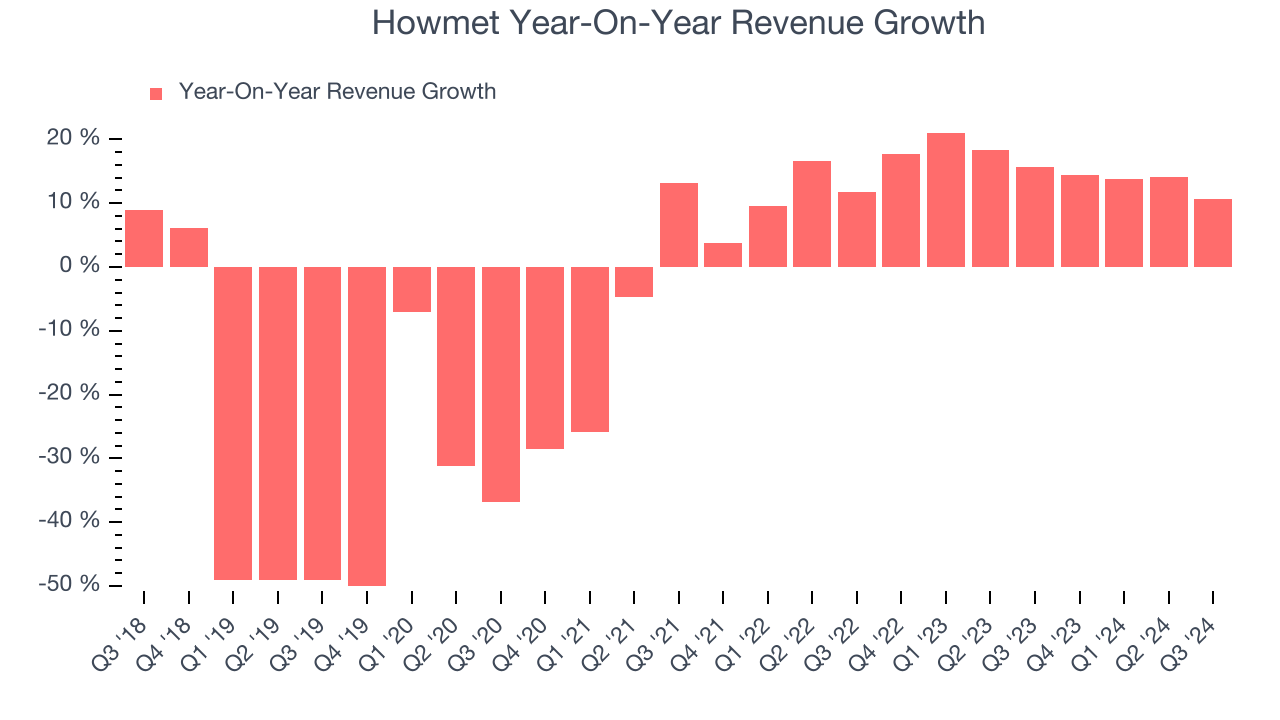
We can better understand the company’s revenue dynamics by analyzing its most important segments, Engine products and Fastening systems, which are 51.5% and 21.4% of revenue. Over the last two years, Howmet’s Engine products revenue (aircraft engines, industrial turbines) averaged 18.7% year-on-year growth while its Fastening systems revenue (connector products and tools) averaged 18.9% growth.
This quarter, Howmet’s year-on-year revenue growth was 10.7%, and its $1.84 billion of revenue was in line with Wall Street’s estimates. Management is currently guiding for a 8% year-on-year increase next quarter.
Looking further ahead, sell-side analysts expect revenue to grow 7.7% over the next 12 months, a deceleration versus the last two years. Still, this projection is above the sector average and shows the market is baking in some success for its newer products and services.
Today’s young investors won’t have read the timeless lessons in Gorilla Game: Picking Winners In High Technology because it was written more than 20 years ago when Microsoft and Apple were first establishing their supremacy. But if we apply the same principles, then enterprise software stocks leveraging their own generative AI capabilities may well be the Gorillas of the future. So, in that spirit, we are excited to present our Special Free Report on a profitable, fast-growing enterprise software stock that is already riding the automation wave and looking to catch the generative AI next.
Operating Margin
Operating margin is a key measure of profitability. Think of it as net income–the bottom line–excluding the impact of taxes and interest on debt, which are less connected to business fundamentals.
Howmet has been a well-oiled machine over the last five years. It demonstrated elite profitability for an industrials business, boasting an average operating margin of 16.7%.
Looking at the trend in its profitability, Howmet’s annual operating margin rose by 8.8 percentage points over the last five years, showing its efficiency has meaningfully improved.
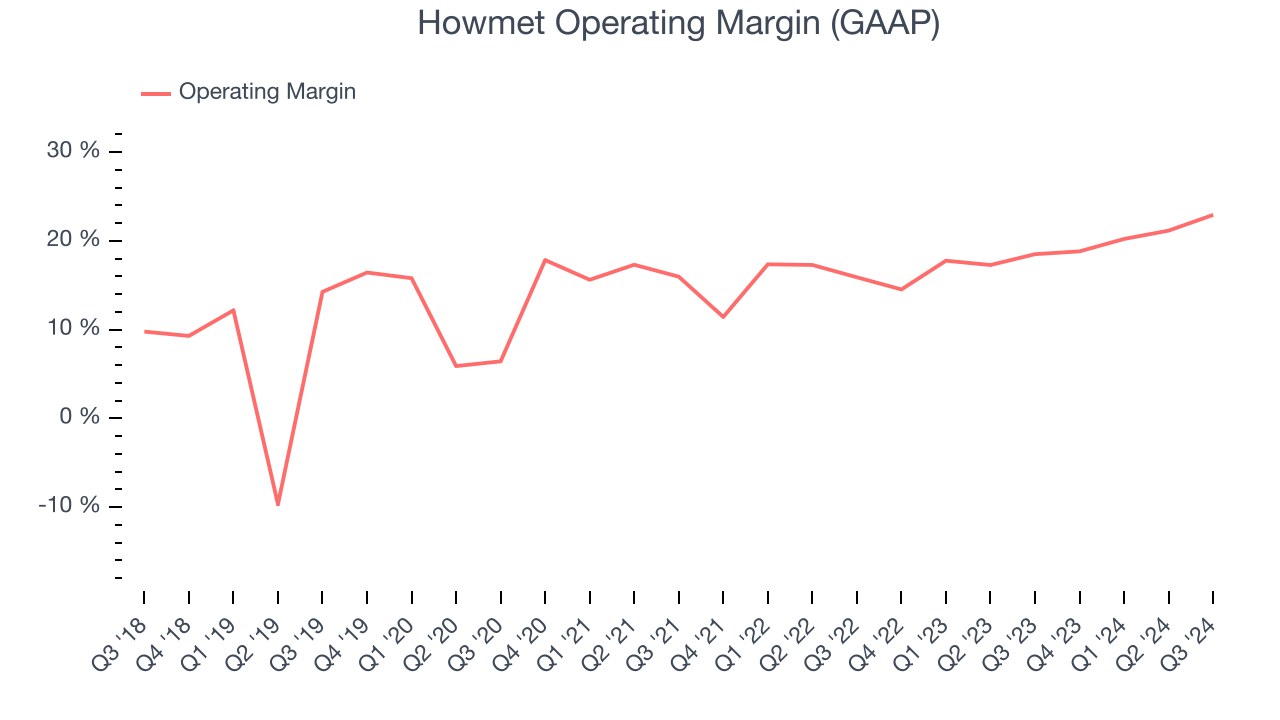
In Q3, Howmet generated an operating profit margin of 22.9%, up 4.4 percentage points year on year. This increase was a welcome development and shows it was recently more efficient because its expenses grew slower than its revenue.
Earnings Per Share
We track the long-term change in earnings per share (EPS) for the same reason as long-term revenue growth. Compared to revenue, however, EPS highlights whether a company’s growth was profitable.
Howmet’s EPS grew at a spectacular 15.1% compounded annual growth rate over the last five years, higher than its 3.8% annualized revenue declines. This tells us management adapted its cost structure in response to a challenging demand environment.
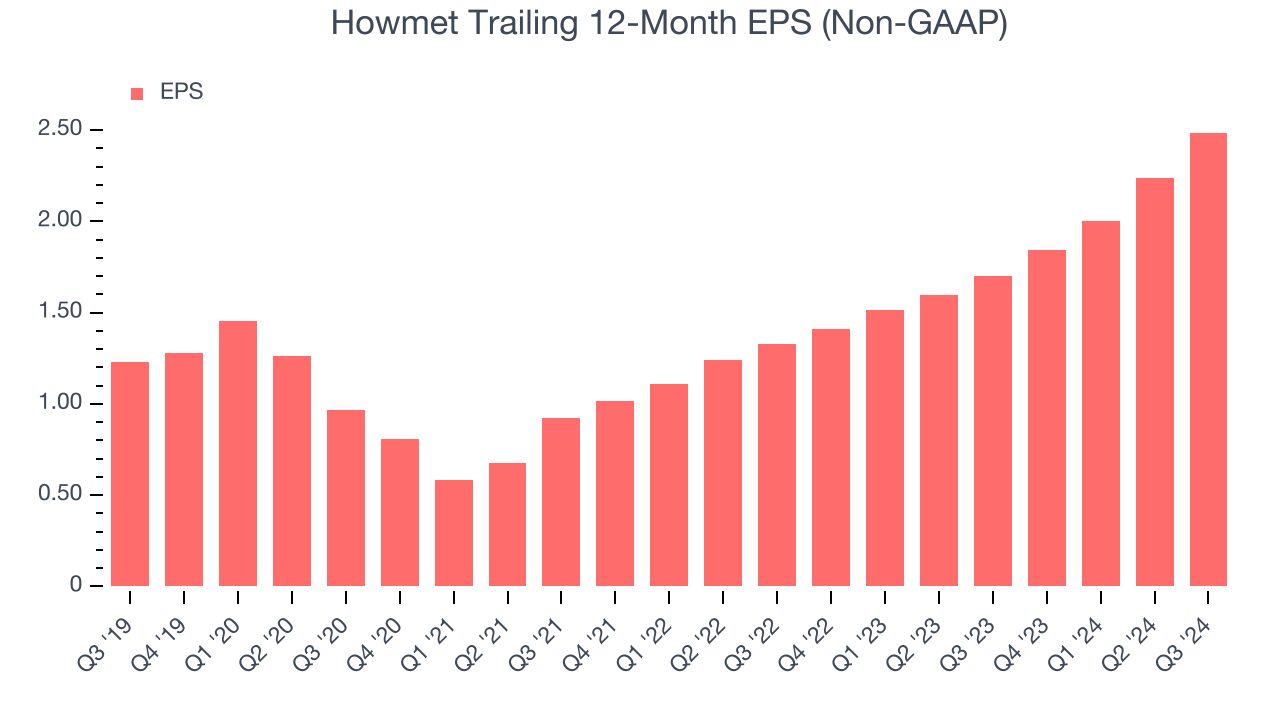
We can take a deeper look into Howmet’s earnings to better understand the drivers of its performance. As we mentioned earlier, Howmet’s operating margin expanded by 8.8 percentage points over the last five years. On top of that, its share count shrank by 10.3%. These are positive signs for shareholders because improving profitability and share buybacks turbocharge EPS growth relative to revenue growth. 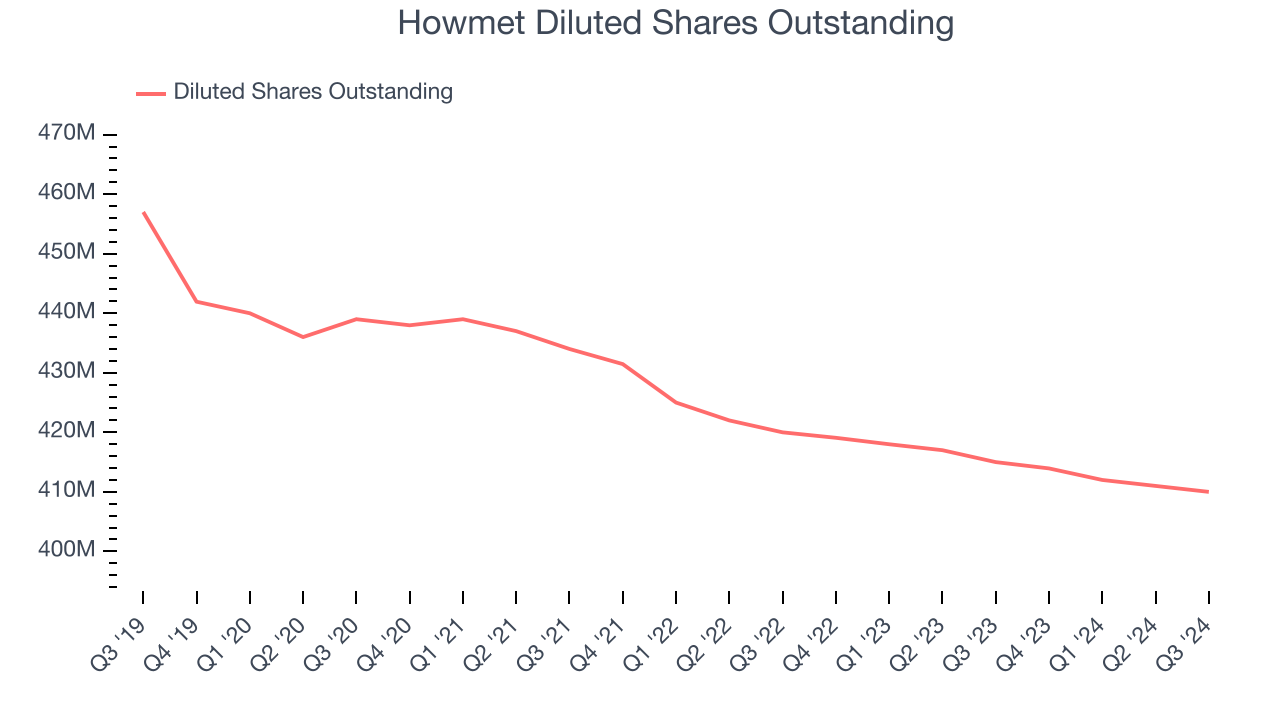
Like with revenue, we analyze EPS over a more recent period because it can give insight into an emerging theme or development for the business.
For Howmet, its two-year annual EPS growth of 36.9% was higher than its five-year trend. We love it when earnings growth accelerates, especially when it accelerates off an already high base.In Q3, Howmet reported EPS at $0.71, up from $0.46 in the same quarter last year. This print beat analysts’ estimates by 8.6%. Over the next 12 months, Wall Street expects Howmet’s full-year EPS of $2.49 to grow by 16.7%.
Key Takeaways from Howmet’s Q3 Results
We enjoyed seeing Howmet raise its full-year EPS guidance. We were also excited this quarter's EBITDA and EPS outperformed. On the other hand, its revenue guidance came in slightly below Wall Street’s estimates. Overall, this quarter was mixed but still had some key positives. The stock traded up 3.5% to $105.72 immediately following the results.
Should you buy the stock or not? We think that the latest quarter is only one piece of the longer-term business quality puzzle. Quality, when combined with valuation, can help determine if the stock is a buy. We cover that in our actionable full research report which you can read here, it’s free.





